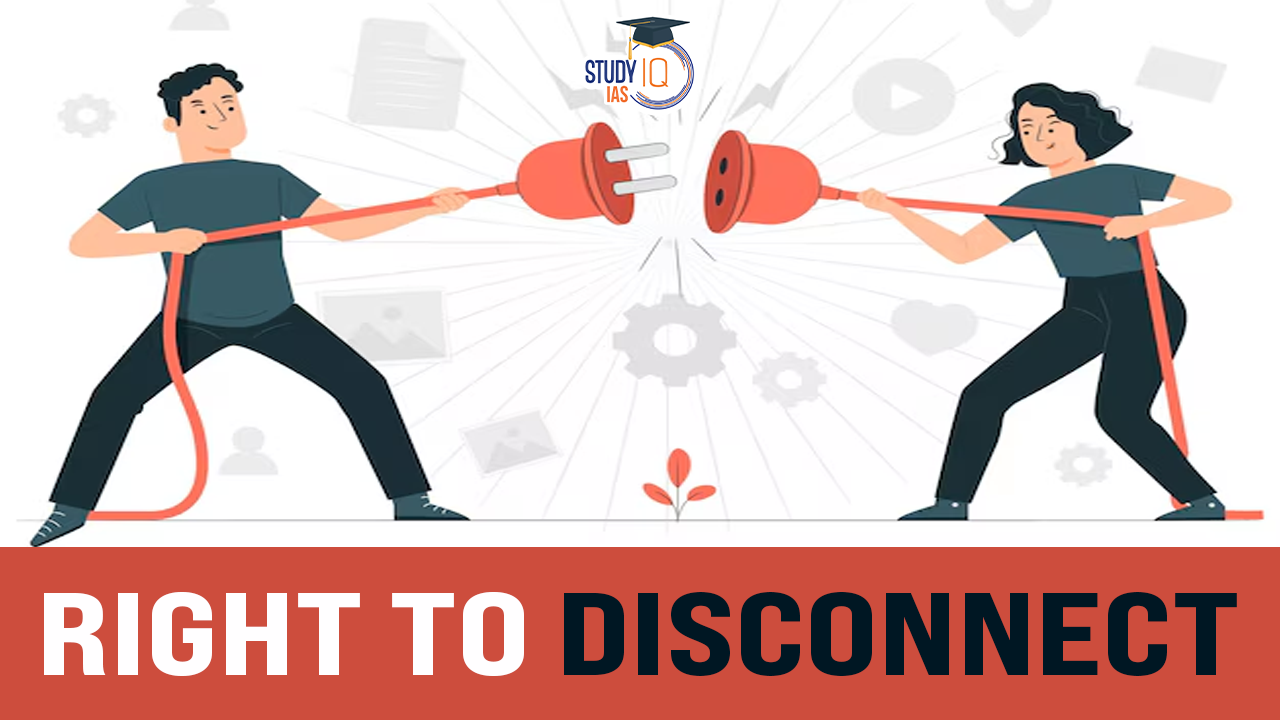Table of Contents
The issue of workplace stress and the demand for the right to disconnect are gaining attention following tragic incidents and emerging data on prolonged working hours.
More in News
- The death of an EY employee in September, allegedly due to work pressure, sparked concern.
- Opponents announced that they would raise this issue in Parliament, condemning “inhumanity at the workplace.”
What is ‘Right to Disconnect’?
- It allows employees to ignore communications from their employers after regular working hours.
- Employees now have the right to decline calls or texts from their employers after work hours without fear of negative repercussions.
- It allows workers to decide when it’s appropriate to respond.
- Any disagreements about after-hours communication should be resolved directly between the employer and the employee.
- Role of Fair Work Commission (FWC): It can mediate disputes between employers and employees regarding after-hours communication.
- The FWC has the authority to order employers to stop contacting employees after hours or, alternatively, require a worker to respond if their refusal is considered unreasonable.
- Failure to comply with FWC orders can result in substantial fines: up to A$19,000 for individuals and up to A$94,000 for businesses.
| Facts |
|
Workplace Stress and Inhuman Working Conditions
- Women Professionals Affected: Indian women in sectors like auditing, IT, and media often work more than 55 hours a week, as reported by The Hindu.
- Impact on Mental Health: According to the ADP Research Institute, 49% of Indian workers report that workplace stress negatively impacts their mental health.
Right to Disconnect Laws in Other Countries
Several countries have implemented laws to protect employees’ rights to disconnect outside of working hours:
- France: The Labour Chamber of the French Supreme Court (2001) ruled that employees are not obligated to work from home or remain reachable after working hours.
- The Cour de Cassation upheld that being unreachable outside working hours does not constitute misconduct.
- Portugal: It is illegal for employers to contact employees outside working hours, except in emergencies.
- Spain: Article 88 of the Organic Law 3/2018 guarantees employees the right to disconnect to protect personal and family privacy and promote work-life balance.
- Australia: The Fair Work Legislation Amendment (2023) grants employees the right to disconnect outside working hours.
- Ireland: Officially recognizes the right to disconnect for employees
India’s Legal Framework and Current Status
India does not yet have specific laws on the right to disconnect, but existing constitutional and judicial principles address workplace dignity and well-being:
Constitutional Provisions
- Article 38: The state must promote the welfare of the people.
- Article 39(e): Policies should secure the health and strength of workers.
Judicial Precedents
- Vishakha v. State of Rajasthan (1997): Recognized the right to dignity at the workplace and issued guidelines to ensure safe working environments for women.
- Ravindra Kumar Dhariwal v. Union of India (2021): Emphasized inclusive equality and reasonable accommodation for persons with disabilities.
- Praveen Pradhan v. State of Uttaranchal (2012): Ruled against public humiliation and inhumane treatment of employees by superiors.
Legislative Attempts
- Supriya Sule’s Private Member Bill (2018):
- Proposed a right to disconnect after working hours.
- Suggested a penalty of 1% of the total remuneration of all employees for noncompliance.
Economic and Social Impact
- India aims to become the third-largest economy by 2030. Recognizing the right to disconnect is vital for:
- Employee well-being
- Increased productivity
- Balanced economic growth
- Employers must consider psychological factors and support work-life balance to ensure sustainable growth.
Arguments in Favour of the Right to Disconnect
- Enhancing Work-Life Balance: It helps employees maintain a healthy work-life balance by ensuring they have dedicated time away from work-related communication.
- Protecting Employee Well-Being: Constant digital connectivity can lead to burnout, stress, and other health issues.
- The right to disconnect helps mitigate these risks by setting clear boundaries for work-related communication.
Arguments Against the Right to Disconnect
- Potential Hindrance to Flexibility: The rigid boundaries created by the right to disconnect might hinder the flexibility needed in certain roles.
- Example: Jobs in emergency services or global operations may require constant availability, and strict disconnection rules could complicate these roles.
- Impact on Business Productivity: This could make it harder for business owners to generate wealth.
- They fear it may impose additional burdens on employers and complicate business operations.
- The rigid boundaries might hinder flexibility. For instance, certain roles (e.g., emergency services) require constant availability.
- Effect on Women’s Workforce Participation: The legislation could negatively impact women’s participation in the workforce.
- The rigid working environment fostered by the law could undermine the case for working from home, which is a flexible option many employees with family responsibilities prefer.
- Confusion Over Work-Related Communication: It blurs the lines between what types of work-related messages are acceptable outside of regular hours.
- This confusion could lead to uncertainty and disputes over what constitutes appropriate after-hours communication.


 Pariksha pe Charcha 2025, Overview, Even...
Pariksha pe Charcha 2025, Overview, Even...
 National Policy on Framework on Agricult...
National Policy on Framework on Agricult...
 How Scientists used Scotch tape to Creat...
How Scientists used Scotch tape to Creat...




















